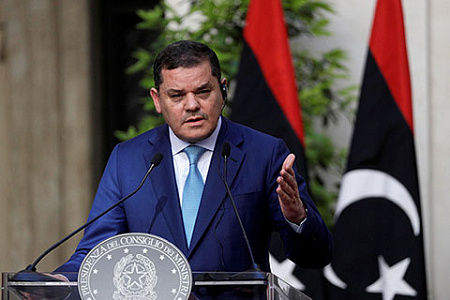
Libya’s internationally recognized government is reportedly engaged in high-level, secret negotiations with Israel to potentially resettle Palestinians from the Gaza Strip, according to Qatari media reports. The talks, allegedly led by a close relative of Prime Minister Abdul Hamid Dbeibeh, are said to come with a significant incentive for the Tripoli-based government: the promise of financial and political backing from Washington, which could include access to an estimated $30 billion in Libyan assets frozen by the U.S. since 2011.
Sources cited by Middle East Eye claim that “practical negotiations” have already taken place concerning the possible relocation of Gazans to the North African nation, though specific timelines and mechanisms have not been finalized. The reports align with information from Israel’s Channel 12, which indicated that the Netanyahu government is exploring resettlement options with several countries. Israeli Agriculture Minister Avi Dichter has publicly described Libya as an “ideal place” for Palestinians, suggesting its vast territory and coastline could be developed with international investment, benefiting both the refugees and the host country.
For Prime Minister Dbeibeh, any engagement with Israel is politically perilous. His government has publicly denied any attempts at normalization, with Dbeibeh stating the Palestinian cause is a “matter of conscience” for Libyans. This denial comes from bitter experience; in the summer of 2023, the revelation of a ministerial meeting with Israeli officials, allegedly to discuss Libya joining the U.S.-brokered Abraham Accords, triggered massive protests across Tripoli. The public outrage forced Dbeibeh to dismiss his foreign minister to prevent a larger political crisis.
Libya remains a deeply fractured and volatile state. The Tripoli government’s hold on power is tenuous, and the capital itself is a hotbed of potential unrest, as demonstrated by recent violent clashes between rival militias following the assassination of a powerful commander. Dbeibeh’s government is already under international pressure for its failure to hold national elections, and an explosive deal with Israel could easily shatter the fragile stability he presides over.
Adding another layer of complexity to the situation, the reports suggest that Tripoli is not the only Libyan faction in contact with Israel. The rival eastern-based administration, led by commander Khalifa Haftar, is also said to be involved in separate talks about accepting Palestinians. Haftar has previously been linked to receiving services from Israeli consultants, indicating that both sides of Libya’s internal conflict may be exploring clandestine ties with Israel, turning the war-torn nation into a new, complex arena for Middle Eastern diplomacy.
